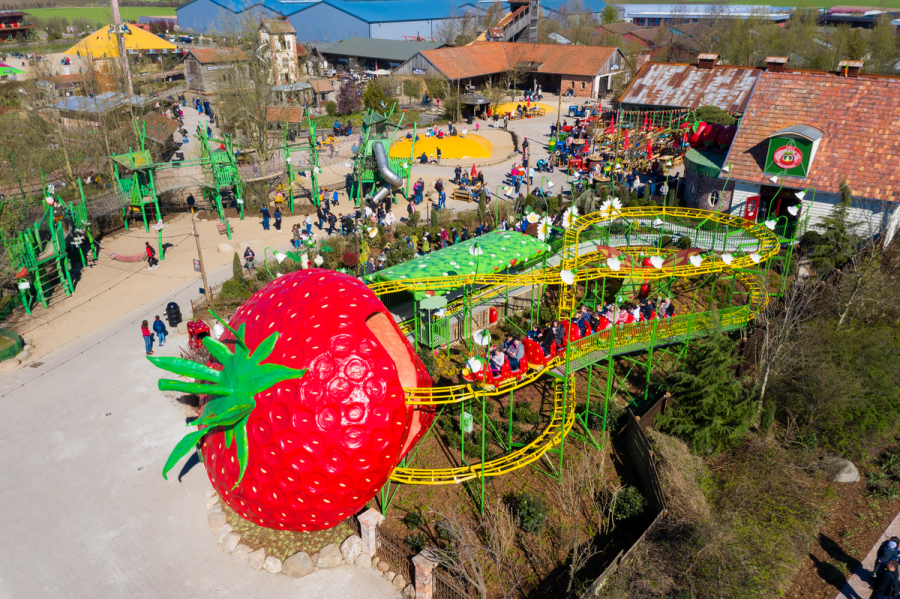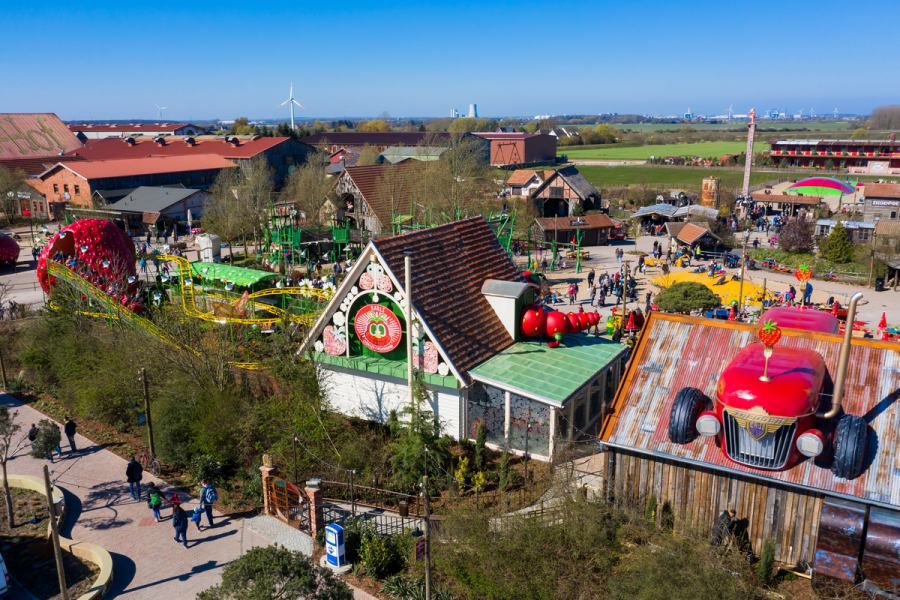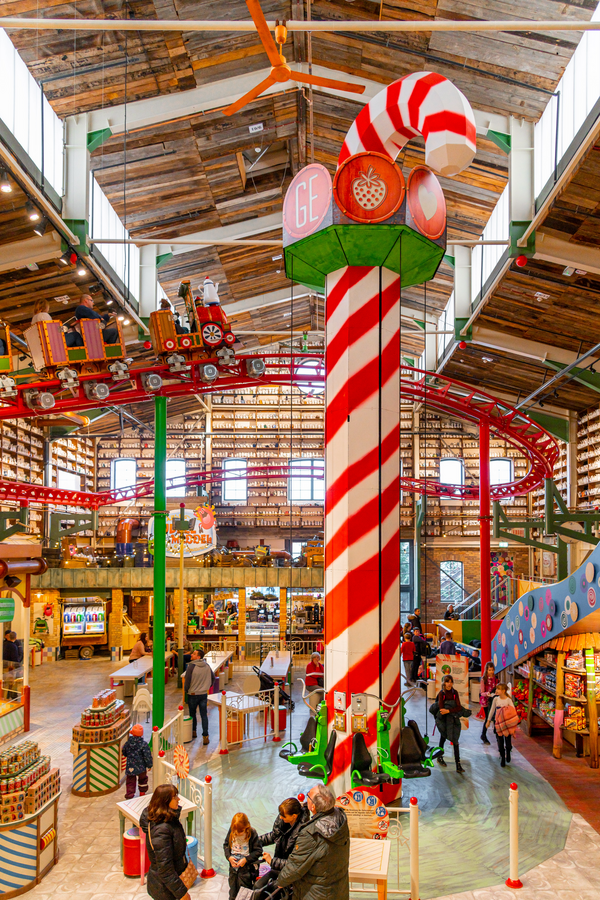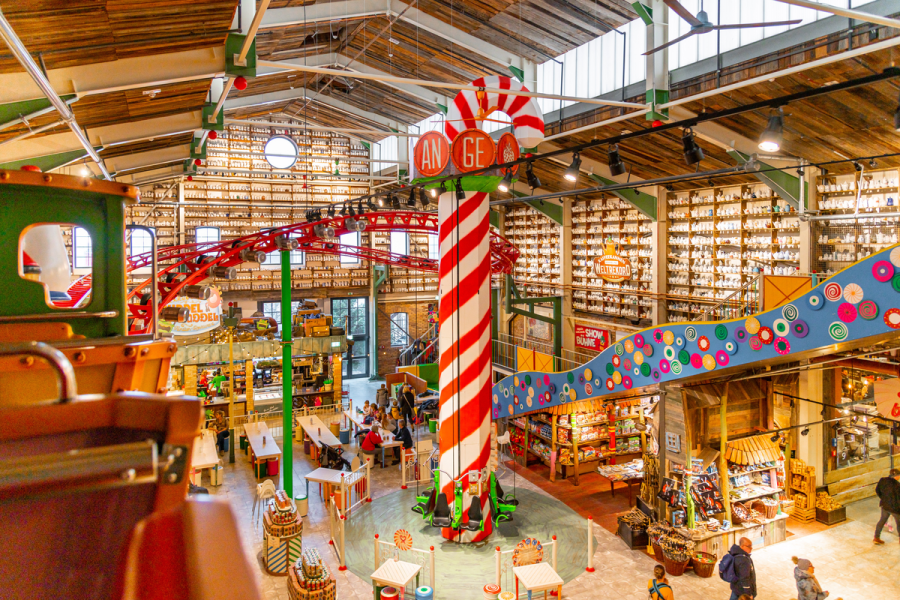Sweet Dreams

For three generations, the Dahl family has shown a remarkable ability to change with the times. Their Karls’ strawberry empire, which celebrates its centennial this year, successfully blends strawberry farming with five Erlebnis-Dörfer (Experience Villages) across Germany. The strawberry-themed parks—in Rövershagen, Elstal near Berlin, Warnsdorf, Zirkow, and Koserow—normally attract 6 million visitors a year.
These edutainment attractions combine amusement park fun with mini “Manufactories,” where guests can see Karls’ culinary artisans make delicious food items like jam, candies, strawberry ice cream, chocolate, bread, coffee, and sausages. “The idea is that people buy them afterward, and it works!” says Robert Dahl, managing director of Karls. Entry is free, although there is a charge for select rides and attractions.
Visitors can also savor treats at the villages’ restaurants, which account for almost 35% of the attraction’s revenue. In 2018, Karls added “Germany’s first upcycling (reusing older items) hotel” at Rövershagen.
Starting Over
It wasn’t always this way. Robert Dahl’s grandfather, Karl—after whom the business is named—originally farmed fruits and vegetables in East Germany. After World War II ended, he fled with his family to Schleswig-Holstein in West Germany and started farming again, supplying strawberries to the Schwartau jam factory. The business arrangement was a sweet deal while it lasted. In 1989, when the Berlin Wall fell and borders with Eastern Europe opened up, cheaper strawberries flooded the market. Karls lost its one and only customer.
That same year, the seeds were sown for a different kind of business. Robert Dahl’s sister Ulrike had watched tennis at Wimbledon during a student exchange visit to England. She returned home with a photo of a strawberry-shaped booth, where servers sold strawberries and cream to the public. It was a lightbulb moment for their father, Karl-Heinz Dahl, who was running the business by then. He asked a shipbuilder to build 20 strawberry-themed booths. Karl’s strawberry kiosks are now a familiar sight on the country’s streets, selling fruit and reminding people to visit the attractions.
In 1993, Robert Dahl opened a Karls farm in Rövershagen, close to his grandfather’s original farm. “To make it more attractive to visitors, I bought a little playground,” he says. “We offered people a cup of coffee and strawberry cake, and that was it. From that point on, it started to grow.” The playground and the restaurant got bigger, and a new business model was born.

Ripe for Growth
Karls’ introduction to the attractions industry “happened more or less by accident,” says Dahl. In 2007, he saw a picture of an ABC Rides ride at an Austrian park. He went to take a look and ordered his own ride. “When we opened it in 2008, people loved it,” he says. ABC Rides later sent him an invitation for IAAPA Expo in Las Vegas. “Until then, I did not know that a whole leisure park industry and exhibition existed. It was like another planet. I liked it a lot,” he says. By 2011, Dahl had essentially created a small amusement park.
“We decided to expand this idea to other places,” says Dahl. Knowing that planning permissions might be hard to get, he and his team spent a year searching for locations. They identified four. “We said, ‘We will start to build the first site wherever we have the permission.’”
The first, purpose-built Erlebnis-Dorf—featuring rides, “Manufactory” experiences, shops, and restaurants—opened on Germany’s largest island, Rügen, in 2012. Two more locations followed in 2014, in Elstal (Berlin) and Warnsdorf, near Lübeck. The fifth Karls Erlebnis-Dorf opened in the holiday hotspot of Koserow in 2016.
Dahl had hoped to open one location every year, but the business faced growing pains. “Our employees had grown from 200 to over 1,000 in only three years,” he says. “We had a lot of stress at that time.” Dahl decided they needed a break to consolidate and get their house in order.
By 2019, he was ready to restart Karls’ expansion. “Now that we know how it works, and it works well, we are in the process of getting permissions for three different locations in Germany,” says Dahl. The company is also working on a Karls-branded park in Hangzhou, China, with a Chinese partner, which will invest in and operate the project. COVID-19 halted work in early 2020, but Dahl hopes the Chinese park will open in 2021, now that building has resumed.

Pandemic Hasn’t Stopped Progress
The pandemic forced Karls to close all its properties on March 17, 2020, just weeks before the new season started. “We stopped everything hard, including a lot of investments,” says Dahl. “When we had the first lockdown, I felt that our company was a little too complicated.” Since then, the family has created a more streamlined organization, which should strengthen Karls in the future.
Fortunately, the business was able to reopen after two months, although managing capacity remains a challenge. Karls’ website has an indicator that shows people how busy each park is in real time before they visit. Business in June 2020 was comparable to June 2019, although revenues dropped by 9% in July. Dahl remains positive because he expects potential lockdowns moving forward to be selective, with their impact limited to individual locations.

Berry Good Ideas
“Diversity has helped us a lot,” says Dahl. Karls can count not only on its leisure offerings, but also on its strawberry harvest, and fellow attraction owners and operators for support and insight. “I love to talk to them. I love this whole industry and its creativity,” says Dahl. Being new to the attractions industry can also be an advantage. “If you do not know how other people do it, it’s easier to change things,” says Dahl. “We do not want to be like a traditional park or a traditional restaurant, it’s always good to be different.”
The family’s instinctive approach has borne fruit. “We do not plan too much. If it feels like a good idea, then we do it. We make mistakes, but people who calculate a lot also make mistakes. Mostly, it works well,” says Dahl.
Karls Bonbon-Land (Candy Land), a 3,000-square-meter indoor area which opened at Rövershagen in December 2019, is one of their best investments yet, according to Dahl. Created for almost 6 million euros in an existing building, Karls Bonbon-Land combines four rides, a family restaurant, specialty retail, and candy production under one roof. Karls has opened a similar Marmeladen-Land (Jam Land), at Elstal.
Spend the Night
Karls has also embraced accommodations. The quirky Hotel Alles Paletti is a showcase for upcycled and recycled materials. Guests can sit outside their rooms on giant garbage bins converted into comfy seats. Washing machine drums turned into lamps create starry illuminations. Carpets are made from 80% recycled plastic ocean waste. “People have a lot of fun there and take pictures every day. It’s a great success,” says Dahl.
Hotel Alles Paletti has 50 family suites (250 beds) and is laid out like a motel, meaning guests can access their rooms from outside. “That helps us a lot during COVID-19,” says Dahl. Karls also offers holiday cottages and a tiny ice hotel (for one family) at Rövershagen.
When Karls was planning its hotels, the family initially thought it was necessary to invest in bigger rides targeting teens and adults. After observing a large amount of families making reservations, Karls changed their opinion. “We have since learned that we should see families with smaller kids as our direction,” says Dahl. Along with large rides, he continues to look for rides and attractions that families can enjoy together.
Dahl’s ambition is “to make Karls one of the best-known family attractions all over Germany.” He is confident “families will want to return to parks in big numbers once COVID-19 is over.” For Karls’ centennial, his own family’s goal is to position the company to be “in great shape,” says Dahl. Success will then taste even sweeter.
